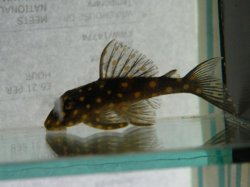You are using an out of date browser. It may not display this or other websites correctly.
You should upgrade or use an alternative browser.
You should upgrade or use an alternative browser.
L 201
- Thread starter Plecostomos Fan
- Start date
JenCliBee
PleC & CorY MaD
Very nice  ... Not sure if your asking a question with this lol.... but it's the big spot version of 201.. very nice indeed
... Not sure if your asking a question with this lol.... but it's the big spot version of 201.. very nice indeed 
 ... Not sure if your asking a question with this lol.... but it's the big spot version of 201.. very nice indeed
... Not sure if your asking a question with this lol.... but it's the big spot version of 201.. very nice indeed Plecostomos Fan
Fish Crazy
Cheers Jake, is it possible to tell the sex from this photo?
JenCliBee
PleC & CorY MaD
From that picture no not really... how big is it?.. it only looks to be a small juvenile and if that's the case you wont correctly sex just yet.
If it happens to be an adult, from that pic i would say female but that at the moment without knowing age/size will just be a guess tbh.
If it happens to be an adult, from that pic i would say female but that at the moment without knowing age/size will just be a guess tbh.
Plecostomos Fan
Fish Crazy
From that picture no not really... how big is it?.. it only looks to be a small juvenile and if that's the case you wont correctly sex just yet.
If it happens to be an adult, from that pic i would say female but that at the moment without knowing age/size will just be a guess tbh.
It is a small juvenile approx 2 inches, very active and seems to like the bogwood.
Mr Seidel refers to it as a Orinoco angel pleco, Hypancistrus sp his picture is bang on but I can find no mention of' Bigspot'.
JenCliBee
PleC & CorY MaD
From that picture no not really... how big is it?.. it only looks to be a small juvenile and if that's the case you wont correctly sex just yet.
If it happens to be an adult, from that pic i would say female but that at the moment without knowing age/size will just be a guess tbh.
It is a small juvenile approx 2 inches, very active and seems to like the bogwood.
Mr Seidel refers to it as a Orinoco angel pleco, Hypancistrus sp his picture is bang on but I can find no mention of' Bigspot'.
Alot of people from alot of places call different plecs by different names.... reading just one persons book and referring to every species by that is going to come up with contradiction from many other places.
Just google 'L201 big spot'.... im sure you will find some info about them, there is alot for sale at the moment.
Obviously the reason there called big spot variety is because there spots are bigger than what i would imagine is call the small spot variety now.
The plec has been referred to as many different names in the past such as contradens, angel, inspector.. all to be changed and re identified at later dates, the L number system isn't ideal and never will be accurate in most cases.
Oh and at 2 inches, you will only be able to make a rough guess on sex.
minnnt
Fish Expert
Thats lovely. Loving the spots on the fins!
TwoTankAmin
Fish Connoisseur
And lets not forget that as plecos age, their patterns typically change. Big spots shrink, closely spaces spots move farther apart, broken lines become solid and solid lines become broken, Some get splotches, some don't. So it can depend on the age/size of a given fish as to what it may or may no look like.
Hoever, when it comes to Mr. Seidel along with Mr Evers, you can assume they are pretty much as accurate as is possible when it comes to pleco information
Hoever, when it comes to Mr. Seidel along with Mr Evers, you can assume they are pretty much as accurate as is possible when it comes to pleco information
Similar threads
- Replies
- 6
- Views
- 377
- Replies
- 3
- Views
- 606
- Replies
- 19
- Views
- 499
- Replies
- 5
- Views
- 712

